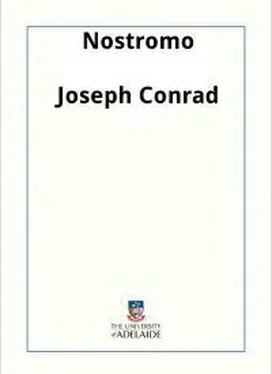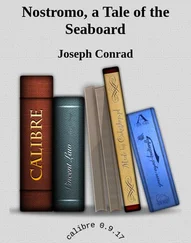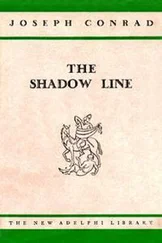Джозеф Конрад - Nostromo - A Tale of the Seaboard
Здесь есть возможность читать онлайн «Джозеф Конрад - Nostromo - A Tale of the Seaboard» весь текст электронной книги совершенно бесплатно (целиком полную версию без сокращений). В некоторых случаях можно слушать аудио, скачать через торрент в формате fb2 и присутствует краткое содержание. Год выпуска: 2006, Жанр: Классическая проза, на английском языке. Описание произведения, (предисловие) а так же отзывы посетителей доступны на портале библиотеки ЛибКат.
- Название:Nostromo: A Tale of the Seaboard
- Автор:
- Жанр:
- Год:2006
- ISBN:нет данных
- Рейтинг книги:4 / 5. Голосов: 1
-
Избранное:Добавить в избранное
- Отзывы:
-
Ваша оценка:
- 80
- 1
- 2
- 3
- 4
- 5
Nostromo: A Tale of the Seaboard: краткое содержание, описание и аннотация
Предлагаем к чтению аннотацию, описание, краткое содержание или предисловие (зависит от того, что написал сам автор книги «Nostromo: A Tale of the Seaboard»). Если вы не нашли необходимую информацию о книге — напишите в комментариях, мы постараемся отыскать её.
Nostromo: A Tale of the Seaboard — читать онлайн бесплатно полную книгу (весь текст) целиком
Ниже представлен текст книги, разбитый по страницам. Система сохранения места последней прочитанной страницы, позволяет с удобством читать онлайн бесплатно книгу «Nostromo: A Tale of the Seaboard», без необходимости каждый раз заново искать на чём Вы остановились. Поставьте закладку, и сможете в любой момент перейти на страницу, на которой закончили чтение.
Интервал:
Закладка:
“He was preparing to hang Dr. Monygham (whom he had on board) at the end of the after-derrick, when the first of Barrios’s transports, one of our own ships at that, steamed right in, and ranging close alongside opened a small-arm fire without as much preliminaries as a hail. It was the completest surprise in the world, sir. They were too astounded at first to bolt below. Men were falling right and left like ninepins. It’s a miracle that Monygham, standing on the after-hatch with the rope already round his neck, escaped being riddled through and through like a sieve. He told me since that he had given himself up for lost, and kept on yelling with all the strength of his lungs: ‘Hoist a white flag! Hoist a white flag!’ Suddenly an old major of the Esmeralda regiment, standing by, unsheathed his sword with a shriek: ‘Die, perjured traitor!’ and ran Sotillo clean through the body, just before he fell himself shot through the head.”
Captain Mitchell stopped for a while.
“Begad, sir! I could spin you a yarn for hours. But it’s time we started off to Rincon. It would not do for you to pass through Sulaco and not see the lights of the San Tome mine, a whole mountain ablaze like a lighted palace above the dark Campo. It’s a fashionable drive. . . . But let me tell you one little anecdote, sir; just to show you. A fortnight or more later, when Barrios, declared Generalissimo, was gone in pursuit of Pedrito away south, when the Provisional Junta, with Don Juste Lopez at its head, had promulgated the new Constitution, and our Don Carlos Gould was packing up his trunks bound on a mission to San Francisco and Washington (the United States, sir, were the first great power to recognize the Occidental Republic)—a fortnight later, I say, when we were beginning to feel that our heads were safe on our shoulders, if I may express myself so, a prominent man, a large shipper by our line, came to see me on business, and, says he, the first thing: ‘I say, Captain Mitchell, is that fellow’ (meaning Nostromo) ‘still the Capataz of your Cargadores or not?’ ‘What’s the matter?’ says I. ‘Because, if he is, then I don’t mind; I send and receive a good lot of cargo by your ships; but I have observed him several days loafing about the wharf, and just now he stopped me as cool as you please, with a request for a cigar. Now, you know, my cigars are rather special, and I can’t get them so easily as all that.’ ‘I hope you stretched a point,’ I said, very gently. ‘Why, yes. But it’s a confounded nuisance. The fellow’s everlastingly cadging for smokes.’ Sir, I turned my eyes away, and then asked, ‘Weren’t you one of the prisoners in the Cabildo?’ ‘You know very well I was, and in chains, too,’ says he. ‘And under a fine of fifteen thousand dollars?’ He coloured, sir, because it got about that he fainted from fright when they came to arrest him, and then behaved before Fuentes in a manner to make the very policianos, who had dragged him there by the hair of his head, smile at his cringing. ‘Yes,’ he says, in a sort of shy way. ‘Why?’ ‘Oh, nothing. You stood to lose a tidy bit,’ says I, ‘even if you saved your life. . . . But what can I do for you?’ He never even saw the point. Not he. And that’s how the world wags, sir.”
He rose a little stiffly, and the drive to Rincon would be taken with only one philosophical remark, uttered by the merciless cicerone, with his eyes fixed upon the lights of San Tome, that seemed suspended in the dark night between earth and heaven.
“A great power, this, for good and evil, sir. A great power.”
And the dinner of the Mirliflores would be eaten, excellent as to cooking, and leaving upon the traveller’s mind an impression that there were in Sulaco many pleasant, able young men with salaries apparently too large for their discretion, and amongst them a few, mostly Anglo-Saxon, skilled in the art of, as the saying is, “taking a rise” out of his kind host.
With a rapid, jingling drive to the harbour in a two-wheeled machine (which Captain Mitchell called a curricle) behind a fleet and scraggy mule beaten all the time by an obviously Neapolitan driver, the cycle would be nearly closed before the lighted-up offices of the O. S. N. Company, remaining open so late because of the steamer. Nearly—but not quite.
“Ten o’clock. Your ship won’t be ready to leave till half-past twelve, if by then. Come in for a brandy-and-soda and one more cigar.”
And in the superintendent’s private room the privileged passenger by the Ceres, or Juno, or Pallas, stunned and as it were annihilated mentally by a sudden surfeit of sights, sounds, names, facts, and complicated information imperfectly apprehended, would listen like a tired child to a fairy tale; would hear a voice, familiar and surprising in its pompousness, tell him, as if from another world, how there was “in this very harbour” an international naval demonstration, which put an end to the Costaguana-Sulaco War. How the United States cruiser, Powhattan, was the first to salute the Occidental flag—white, with a wreath of green laurel in the middle encircling a yellow amarilla flower. Would hear how General Montero, in less than a month after proclaiming himself Emperor of Costaguana, was shot dead (during a solemn and public distribution of orders and crosses) by a young artillery officer, the brother of his then mistress.
“The abominable Pedrito, sir, fled the country,” the voice would say. And it would continue: “A captain of one of our ships told me lately that he recognized Pedrito the Guerrillero, arrayed in purple slippers and a velvet smoking-cap with a gold tassel, keeping a disorderly house in one of the southern ports.”
“Abominable Pedrito! Who the devil was he?” would wonder the distinguished bird of passage hovering on the confines of waking and sleep with resolutely open eyes and a faint but amiable curl upon his lips, from between which stuck out the eighteenth or twentieth cigar of that memorable day.
“He appeared to me in this very room like a haunting ghost, sir”—Captain Mitchell was talking of his Nostromo with true warmth of feeling and a touch of wistful pride. “You may imagine, sir, what an effect it produced on me. He had come round by sea with Barrios, of course. And the first thing he told me after I became fit to hear him was that he had picked up the lighter’s boat floating in the gulf! He seemed quite overcome by the circumstance. And a remarkable enough circumstance it was, when you remember that it was then sixteen days since the sinking of the silver. At once I could see he was another man. He stared at the wall, sir, as if there had been a spider or something running about there. The loss of the silver preyed on his mind. The first thing he asked me about was whether Dona Antonia had heard yet of Decoud’s death. His voice trembled. I had to tell him that Dona Antonia, as a matter of fact, was not back in town yet. Poor girl! And just as I was making ready to ask him a thousand questions, with a sudden, ‘Pardon me, senor,’ he cleared out of the office altogether. I did not see him again for three days. I was terribly busy, you know. It seems that he wandered about in and out of the town, and on two nights turned up to sleep in the baracoons of the railway people. He seemed absolutely indifferent to what went on. I asked him on the wharf, ‘When are you going to take hold again, Nostromo? There will be plenty of work for the Cargadores presently.’
“‘Senor,’ says he, looking at me in a slow, inquisitive manner, ‘would it surprise you to hear that I am too tired to work just yet? And what work could I do now? How can I look my Cargadores in the face after losing a lighter?’
“I begged him not to think any more about the silver, and he smiled. A smile that went to my heart, sir. ‘It was no mistake,’ I told him. ‘It was a fatality. A thing that could not be helped.’ ‘Si, si!” he said, and turned away. I thought it best to leave him alone for a bit to get over it. Sir, it took him years really, to get over it. I was present at his interview with Don Carlos. I must say that Gould is rather a cold man. He had to keep a tight hand on his feelings, dealing with thieves and rascals, in constant danger of ruin for himself and wife for so many years, that it had become a second nature. They looked at each other for a long time. Don Carlos asked what he could do for him, in his quiet, reserved way.
Читать дальшеИнтервал:
Закладка:
Похожие книги на «Nostromo: A Tale of the Seaboard»
Представляем Вашему вниманию похожие книги на «Nostromo: A Tale of the Seaboard» списком для выбора. Мы отобрали схожую по названию и смыслу литературу в надежде предоставить читателям больше вариантов отыскать новые, интересные, ещё непрочитанные произведения.
Обсуждение, отзывы о книге «Nostromo: A Tale of the Seaboard» и просто собственные мнения читателей. Оставьте ваши комментарии, напишите, что Вы думаете о произведении, его смысле или главных героях. Укажите что конкретно понравилось, а что нет, и почему Вы так считаете.












